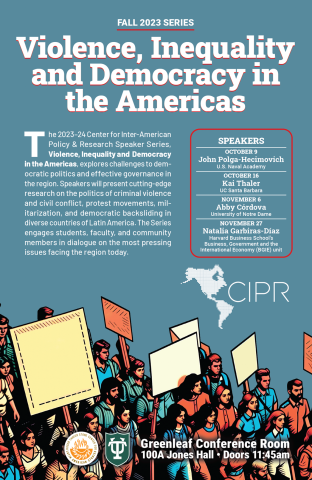
The 2023-24 Center for Inter-American Policy and Research Speaker Series: Violence, Inequality and Democracy in the Americas, explores challenges to democratic politics and effective governance in the region. Speakers will present cutting-edge research on the politics of criminal violence and civil conflict, protest movements, militarization, and democratic backsliding in diverse countries of Latin America. The Series engages students, faculty, and community members in dialogue on the most pressing issues facing the region today. This week’s talk will be given by Abbey Córdova from the University of Notre Dame on the topic “Citizen Responses to Gender and Non-Gender based Violence in Criminal Wars”.
Across the world, the spread of organized crime and governments’ militarization of public security has resulted in numerous accounts of gendered and non-gendered crimes committed by both criminal and state armed actors. Citizen support for all victims of violence, and thus willingness to stand-up for victims’ human rights, is quintessential for promoting democratic societies sustained in the rule of law. This study examines the extent to which attitudes toward victims in the context of criminal wars depend on four largely understudied characteristics: victims’ gender (men or women), perpetrators’ identity (criminal or state armed actors), the type of violence suffered (gender or non-gender based), and the salience of organized criminal groups’ territorial control. This study posits that hindsight bias and the stigmatization of residents in controlled territories explain citizen attitudes toward victims, and that these attitudes vary along victimization type and the identity of victims and perpetrators. The results show that citizens are more likely to condemn violence against women, especially sexual violence, compared to violence perpetrated against men; yet, public opinion is more tolerant of all violent acts committed by state armed actors than members of OCGs, particularly when aggressions occur in places marked by OCGs’ territorial control.
